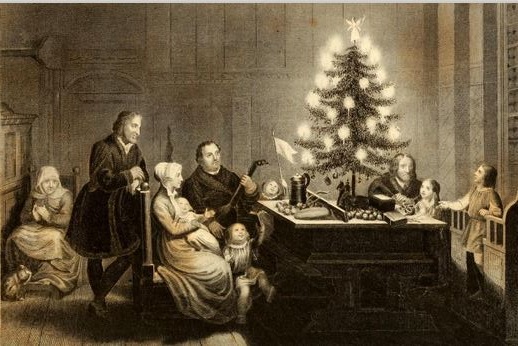By Cris Putnam
Christmas is certainly not pagan. Sure, Jesus’ birth was probably in the Fall rather than December but the exact day is uncertain. Even so, Christmas is the celebration of the savior’s birth because that is when most all Christian churches celebrate. While some customs have a distant pagan origin, the idea that Christmas trees are pagan is almost certainly false. Jeremiah 10 describes fashioning Canaanite idols from fresh cut wood and precious metals. It has nothing to do with Christmas trees. There have been a myriad of customs in different cultures using holly and evergreen but there is not a discernable evolution from paganism to today’s Christmas tree from the ancient world. Christianity relegated pagan belief to the cultural dustbin and tree customs were sporadic and divergent until after the reformation. The modern tree began in sixteenth century Germany. The best evidence points to Martin Luther for popularizing the candle lit evergreen tree.[i] As the reformation spread, so did Luther’s legacy. A popular artist, Carl Schwerdgeburth, painted a scene of Luther’s family around a candle-lit tree:
Painting source[ii]
This painting, depicting what oral tradition indicated happened in 1536, was engraved in a gift book titled Wheat Sheaf from 1853 that was published in Philadelphia. It also said that Luther was the first to light a tree with candles in order to illustrate the “light of God” to his children.
Because Luther was a great advocate of Christmas, the Christmas tree became a sign of Protestant solidarity and German nationalism. The Catholic majority of the lower Rhine discouraged the lighted tree as a Protestant custom. In the early nineteenth century, lit trees gained widespread acceptance across Germany.[iii] Most likely, the tradition came to the United States with Hessian troops during the American Revolution and/or the German immigrants to Pennsylvania and Ohio.
Many have pointed out the New England puritans did not recognize the holiday. However, their reasoning for disdain was not its alleged pagan origins but rather a form of strict biblicism that asserted that if a holiday is not in scripture it should not be celebrated. Not many folks still agree that conclusion is scriptural because it is inconsistent with our freedom of conscience in Christ (Col 2:16). Because we are not under Israelite ceremonial law, we are free to celebrate the birth of the savior any day we please! Finally, it is safe to say, that hardly anyone is thinking about pagan deities while performing Christmas traditions. Most of the conspiracy theories give paganism too much credit. Paganism did not infect Christianity but rather Christianity made paganism irrelevant.
[i] Karal Ann Marling, Merry Christmas! Celebrating America’s Greatest Holiday,( Boston: Harvard University Press, 2009), 176.
[iii]Johannes Marbach, The Holy Christmas season for meaning, history, customs and symbols (Stutgart: 1859), 416. http://books.google.com/books?id=FXhEAAAAcAAJ&pg=PA416#v=onepage&q&f=false




